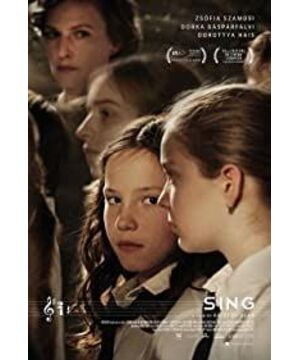This year's Oscar for best live-action short film "The Secret of the School Choir".
A girl named Sophie transfers to a new school and applies to join the school choir. The choir is about to enter an important competition, and the reward for winning is a trip to Sweden. On the first day of rehearsal, the choir teacher found that Sophie had no talent for singing, so she said to her: In the future rehearsal, you can open your mouth but not sing aloud, and warned her not to speak out.
Sophie and Lisa became good friends. Lisa was very talented in singing. She found that Sophie, who likes to sing, did not participate in the choir rehearsal. Under Lisa's questioning, Sophie cried and expressed her grievances.
The second day of the choir rehearsal, Lisa carefully observed the classmates around her, and found that there were students who could not speak like fish with their mouths open.
The choir teacher calmly told Lisa that life is always unfair.
You love the choir, everyone loves it, everyone wants to be a part of it, everyone is working hard to be the best, including those who don't sing. Not everyone is as gifted as you, is it fair if only gifted people are allowed in?
If we let everyone sing, we'll never win. Some people can't sing well, that's a fact, I never thought that was a shame, it wasn't a sin.
What good is it not to sing? Singing silently will let us win the competition, make your beautiful voice stand out, and then we can go to Sweden together, where everyone can say they are part of the best choir.
Frankly, what if any of you on a whim decided to let us lose this, especially you, with your wonderful singing voice? I don't think this is fair. If anyone wants to leave the choir, please do so. Teachers will be happy and your parents will be disappointed.
Lisa silently returned to the chorus. After the rehearsal, the two friends were still filled with righteous indignation. Lisa felt that this was too unfair, everyone has the right to sing and speak. Then they discussed a countermeasure. During the singing competition, all the members sang silently.
In the 26-minute short film, I actually saw tears.
According to Kant, the moral value of an action is not constituted by the consequences that follow, but by the intention to accomplish the action. From this point of view, the teacher's behavior is indeed immoral. To take a discriminatory act in order to win the game is an artificial injustice.
Think again, if, for the sake of fairness, the unequal singing style in the choir is corrected, so that every child who likes to sing can sing freely. Is it another form of inequality for a talented group of children to win a singing competition?
When Michael Sandel discussed the reasons for equality in his book "Justice", he quoted the American political philosopher John Rawls's "Theory of Justice" as saying:
The difference principle actually embodies an agreement to treat the distribution of natural talents as a common asset and to share the benefits of that distribution, regardless of the outcome.
That is, correcting the unequal distribution of talent and talent without putting obstacles in the way of those who are gifted.
In all competitions, we need to analyze and compare various winning strategies. Comparison means choice. If there is choice, there must be standards. If there are standards, then the standard of choice means discrimination. Discrimination is ubiquitous and unavoidable. The key depends on how the standards of discrimination are formulated and how to balance and choose.
Rawls suggests that we do it this way: agree to "share destiny with others" and "only do so if exploiting the contingency of those natural and social circumstances can benefit the whole".
The story of the movie is very well told, and it gives a result of innocence conquering the secular, which is very warm.
View more about Sing reviews







